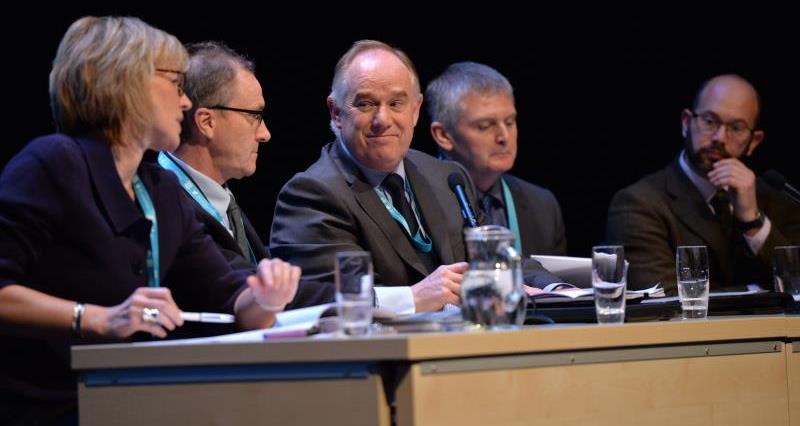Farming, across every sector, faces the challenge of embracing innovation and new ways of thinking to remain productive and competitive while maintaining high quality and standards, safety and affordability.
That was the view of the panel during the 'Produce' workshop on the afternoon of day one of conference.
The group of experts debated how increasingly growing populations in the UK and abroad will need to be fed while the UK farming industry finds the best way to invest in sustainability – both in financial terms and in time.
In the workshop, Andrea Graham, NFU head of policy services, was joined on the panel of experts by Professor Ian Boyd (Defra chief scientific adviser), Calum Murray (Innovate UK), Richard Laverick (AHDB chief technical officer) and the NFU’s own Jake Freestone (farm manager at Overbury Enterprises).
NFU members heard that there was a need to make the most of technological advances and the growing pool of data and knowledge sharing that was now available across all sectors of farming.
Mr Murray described how Innovate UK’s aim was “to help the UK economy grow head and shoulders above other nations by inspiring and supporting pioneering UK businesses to create the industries of the future".
Richard Laverick highlighted how the ADHB was trying to inspire British farming to be more competitive and resilient through co-ordination and a fresh approach to sharing knowledge and developing thought leadership.
The panel agreed barriers still exist. These include a fragmented landscape, duplication of effort, tradition, previous experience, long-term stability, the availability to finance change, and getting the knowledge and having the confidence to deliver the changes within the business.
From the farmer’s perspective Jake Freestone said there was a need for business innovation, to reduce costs, as well as environmental and social innovation.
Mr Freestone said: “We need to keep farming moving with the times. Staying still is actually going backwards compared to the competition.
“We embrace new technology, including zero tillage and this created operational savings of £50,000 per year in fuel, labour and machinery.
“The amount we saved in machinery costs when establishing a crop of wheat using zero tillage went down from £120/ha to about £50/ha, while fuel use was down from 42litres/ha to 17l/ha.”
“We need to share ideas with each other and have the confidence to trust our ideas and get on with it.”
Top #NFU17 content
- Get all the news from #NFU17 - visit our Conference Hub
- NFU17: Three key priorities for dairy
- NFU17: A changing world for livestock
- NFU17: Crop protection dominates cereals session
- NFU17: the future of the beet crop
- Liam Fox to receive British food hamper sent from NFU Conference
- NFU17: Videos - mapping the brave new world
- NFU17: 'Produce' workshop embraces innovation
- NFU17: Making the most of the tenant sector post Brexit
- NFU17: Working together for an organic future
- NFU17: Next generation paves the way
- NFU17: Horizon-scanning for the environment
- NFU17: Striking a good deal for the uplands
- NFU17: Paving the way for Welsh agriculture
- NFU17: Farming's 7:1 return on investment revealed
- NFU17: 'Consume' workshop explores trends
- NFU17: Delegates get a worldwide take on our post-Brexit future
- NFU17: Contract check service will save members time and money
- NFU17: Picture highlights of day one
- NFU17: Post-Brexit deals - action must start now
- NFU17: 75% bridging payment WILL be available, says Leadsom
- NFU17: 'Give farmers a more certain future,' NFU urges SoS
- NFU17: Conference spotlight for post-Brexit trade and investment
- NFU17: Agri research vital for farming's future, says report
- NFU17: Watch the opening video
